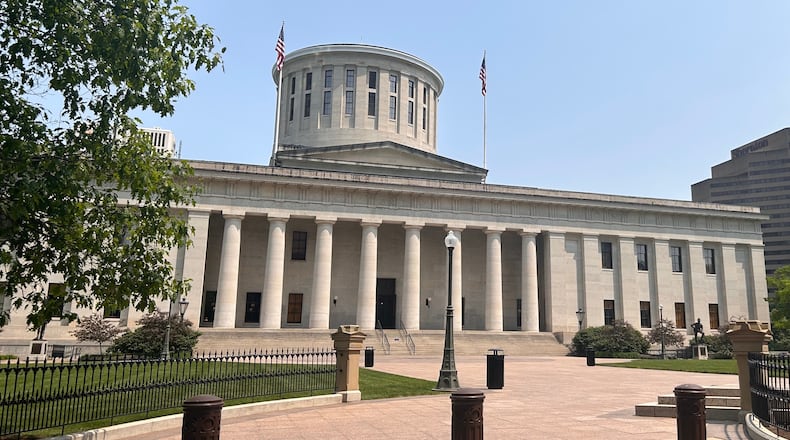“From the day that it was passed, the urgency was not a part of the House’s considerations,” Stephens said. “We can’t let the urgent get in the way of the important. It’s just such a big change in Ohio’s law, culture, all of these things, that we need to be deliberative about it and we want to be respectful.”
Since Ohio voters approved Issue 2 on Election Day, legislators have been scurrying to override the statute with various levels of their own input.
The Senate teamed up with Gov. Mike DeWine to finalize its recreational marijuana proposal last week.
The Senate bill would reduce home grow limits from 12 plants per household to six; raise the cannabis tax rate from 10% to 15% and change where those funds would go; and reduce the maximum THC content in cannabis extract products; while also adding an avenue for individuals to get cannabis charges expunged and allowing medical dispensaries to begin recreational sales within three months of the bill’s passage.
Both the Senate and DeWine urged the House to act quickly. In their view, the time frame between marijuana possession becoming legal on Dec. 7 and the first state-sanctioned sale of recreational marijuana (about nine months under Issue 2) poses the risk of turning more Ohioans toward either the black market or to Michigan.
Stephens noted that the House’s proceedings need to take into account the concerns raised by the Governor and the Senate, while also respecting the will of the voters as much as possible.
When asked if he felt like the Senate’s plan respected the voters’ will, Stephens said, “Well, we’re not going to concur on it, so…”
The House has remained relatively mum about its points of disagreement with the Senate’s proposal, but Republican and Democratic leadership within the chamber has provided a few clues.
First, taxes. Stephens told reporters that there’s “a little bit of difference” between the chambers regarding whether local governments or the state government should have more control over tax revenue raised through recreational marijuana sales. Issue 2 generally gives more of that power to locals, while the Senate keeps it at the state. Stephens said he’s “a local government kind of guy.”
But there’s also concern about the overall tax rate. Minority Leader Allison Russo, D-Upper Arlington, told reporters Tuesday that she wouldn’t divulge what tax rate she’d support, but suggested that it would likely be in between the Senate’s 15% proposal and Issue 2′s 10% rate.
“We want to make sure that the tax rate is not so high that … we’re sending people across state lines, or … that we’re just incentivizing the black market,” Russo said. “I think there’s a sweet spot there that’s probably slightly higher than what it was in the initiative.”
Russo said she hopes the House maintains Issue 2′s THC content limits and home grow provisions.
Meanwhile, the House continues its steady deliberations on House Bill 354, its own Issue 2 reform. Lawmakers heard public testimony Tuesday in the House Finance Committee.
Some testimony voiced opposition to the Senate’s bill, or to provisions the House is considering; others voiced a general opposition to any and all changes to Issue 2.
“People didn’t vote for over 70% of our tax revenue to go to law enforcement and four different specialty funds. People didn’t vote for higher taxes that are going to weigh down our cultivators and send people back to Michigan. People didn’t vote for half of the plant allowance that you guys are now offering,” Athens County marijuana advocate Saraquoia Bryant told the committee. “I understand that what we voted on is a regulatory outline, and I would only request that that outline is utilized and not cut up.”
With no House vote set for Wednesday’s session, the legislature is not likely to agree on Issue 2 reform before lawmakers recess until mid-to-late January — but that could change.
“We could be dealing with this this week, in January or as late as April or not at all,” Russo said. “That’s also on the table as well, because Issue 2 will move forward as passed by voters.”
Follow DDN statehouse reporter Avery Kreemer on X or reach out to him at Avery.Kreemer@coxinc.com or at 614-981-1422.
About the Author

